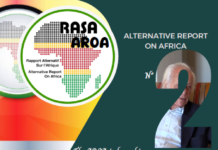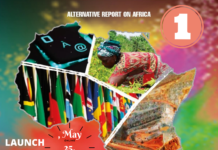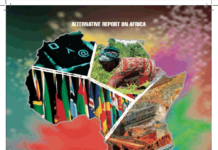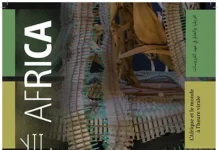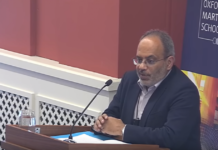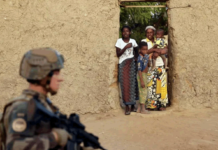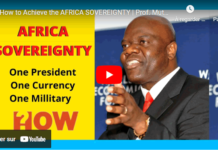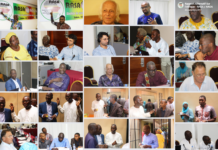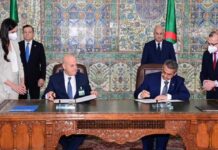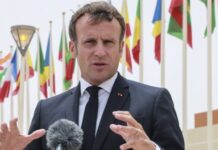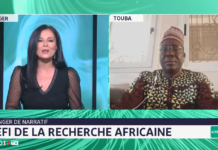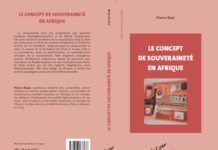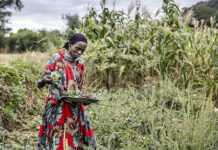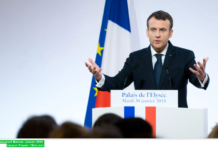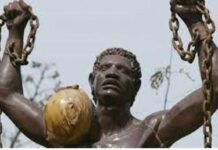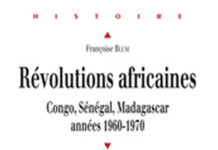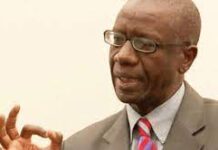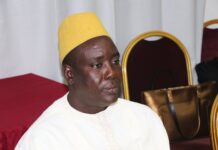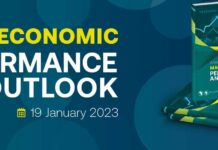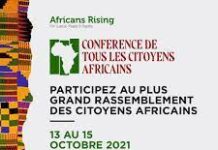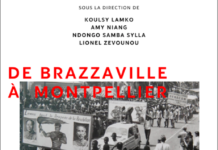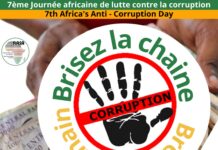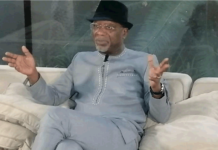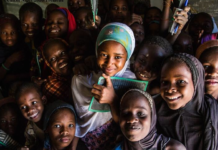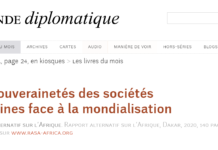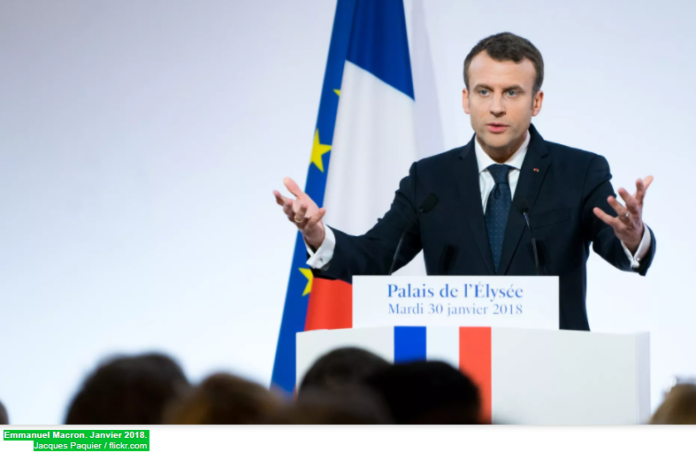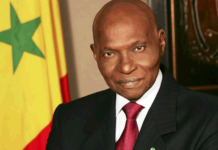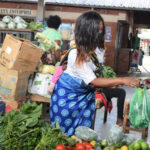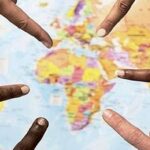By Lionel Zevounou, Ndongo Samba Sylla, Amy Niang, October 4, 2021
This text is taken from a book to be published soon: From Brazzaville to Montpellier. Regards critiques sur le néocolonialisme français, edited by Kously Lamko, Amy Niang, Ndongo Samba Sylla and Lionel Zevounou, published by Cora.

The next Africa-France Summit will be held without heads of state on October 8. As is often the case, Emmanuel Macron likes to play the « disrupter ». Under the guise of modernity, the place given to « civil society » and recognized intellectuals is in reality an attempt to maintain a hegemonic ambition that is increasingly challenged.
What is the purpose of the France-Africa summits? This provocative question was raised by Thomas Sankara at the Vittel Summit in October 1983. In front of a defensive French press, the Burkinabe head of state and revolutionary leader admitted that he did not have a satisfactory answer, since it was obvious, according to him, that this type of meeting was not the most appropriate framework to discuss African problems. Despite Sankara’s criticism, French-speaking heads of state, gradually joined by their counterparts from the rest of the continent, continue to sacrifice to this ritual recently renamed « Africa-France » summit, no doubt to ward off the usually unflattering images associated with « Françafrique.
The novelty of the format of the next Africa-France summit in Montpellier, scheduled for October 8, lies in the absence of heads of state and in the introduction of « civil society, » and in particular of renowned African personalities that French President Emmanuel Macron has chosen as his interlocutors. The erection of this « civil society » of a neo-imperial nature must be interpreted as a desperate attempt to maintain an increasingly thwarted hegemonic ambition.
The idea that France’s future and its geopolitical status are inextricably linked to the maintenance of a special and asymmetrical relationship with its former African colonial empire has been and continues to be the backdrop of French policy towards Africa. However, despite the strategic importance of the continent, France has never had an African foreign policy worthy of the name in Francophone Africa. Because it has never needed one: it has been able to maintain a form of neo-colonial control.1
A SENSE OF LOSS OF CONTROL
Instead of a classic foreign policy, France has long mobilized the register of injunctions in its former empire. Starting with the Brazzaville Conference (1944), which was held without the presence of Africans, even though it was supposed to discuss the march of so-called French Africa towards independence. Since then, for French-speaking Africa, France remains the privileged country where democracy (La Baule 1990), security issues (Pau Summit of January 13, 2020), development financing (Paris Summit on African economies of May 2021), etc. are discussed. Moreover, almost all United Nations (UN) resolutions on francophone Africa are either influenced or sponsored by France.2
These asymmetrical relations are less and less tolerated by African populations, as demonstrated by the attacks on French economic interests during the March 2021 popular uprising in Senegal, and the popular protest against the French military presence in Mali. In addition to what French officials and the mainstream media tend to call « anti-French sentiment, » Paris is experiencing economic competition from China in its African « preserve, » as well as military-diplomatic rivalry with other powers such as Russia, particularly in the Central African Republic, and Turkey.
This context gives rise, on the French side, to a feeling of loss of control as well as a certain anxiety about the future of a continent.
The fact is that the traditional devices for maintaining imperial hegemony have also shown their limits. Military interventions seem destined to fail. In addition to being costly, they are becoming less and less popular with African public opinion. This is probably how the announced « end » – in fact the reorganization – of the Barkhane operation in Mali should be read. Similarly, the gap between a ruling minority supported by Paris and the aspirations of their peoples is widening. The alliance with loyal heads of state, as illustrated by the deceptive « reform » of the CFA franc announced in December 2019 by Ivorian President Alassane Ouattara alongside his French counterpart, is fueling a growing mistrust and suspicion of France. Finally, these leaders do not generally shy away from opening their economies to rival powers ready to grant the desired funding.
MACRON, ARCHITECT OF THE « RESTART
The improvisations of the current French government, and in particular the enlargement of its circle of alliances to include « civil society », must be seen in the light of the new challenges facing France on the African continent and the inadequacy of its traditional methods of intervention.
To say that the current French government’s African policy is still in its old, gilded guise is a truism. One need only think of the dynastic and military succession that Macron endorsed with the recent coup in Chad. Macron’s African policy, however, has a specific cachet that the Montaigne Institute, a right-wing think tank, refers to in a September 2017 report as restart3.
In formal and rhetorical terms, the restart would consist of Paris abandoning its inhibitions by adopting a discourse that « lifts the taboos » as well as a more « frank » strategy. This concern to restore France’s image in Africa explains some recent « symbolic » overtures: the project to return certain cultural property, the covert recognition of France’s responsibility during the Tutsi genocide in Rwanda, the « facilitation » of the opening of colonial archives in Algeria and those relating to the assassination of Thomas Sankara.
On the substance, the restart is betting on an « Afro-realism » in which French entrepreneurs and start-ups would be the spearhead: « [The] restart speech must free energies and promote access of French companies to African markets », underlines the Institut Montaigne. Alongside traditional political support, economic influence is gaining renewed importance. This is undoubtedly one of the motivations behind the establishment of the Presidential Council for Africa (CPA) in 2017, a consultative structure composed of personalities mainly from the business world.
« RISK NEUTRALIZATION »
Influence via the « market » has the advantage of creating a community of interests between France and its European partners, also anxious to compete with China, Russia, Turkey and sometimes the United States. In return for concessions on the economic opening of the French-speaking world, France advocates a mutualization of military management, embodied by the Europe of Defense.
This economic diplomacy, at present, is part of the « Wall Street Consensus », a concept that refers to the new development agenda of international financial institutions, multilateral development banks, development agencies and financial asset management companies. The objective is to maximize private financing in the countries of the global South by protecting them from various risks (political risk, demand risk and exchange rate risk). This philosophy of « development as risk neutralization » is the basis of Macron’s « New Deal » for Africa. It not only implies privatization of public services, through instruments such as public-private partnerships (PPPs), but also transforms states into benevolent insurers of the profits of international investors.4 In the final twelve-page declaration of the New Deal for Africa, Macron’s government has made a number of recommendations for the future.
In the twelve-page final declaration of the recent Paris Summit on Financing African Economies, the word « risk » appears 19 times. The increased resonance of this type of neoliberal approach on the continent is made possible by the functionalist, depoliticized and technocratic approach of economic decision-making circles and institutions such as the African Union.
A « CIVIL SOCIETY » TAILORED TO THE NEEDS OF THE PEOPLE
The Africa-France summit in Montpellier will formally consecrate the alliance between Macron’s regime and an African « civil society » tailored to give the illusion that he is listening to the African people and their intellectuals. Faced with the illegitimacy of the leaders of French-speaking Africa, traditional allies of France, it may have seemed astute to erect a neo-imperial « civil society » whose vocation is to serve as a shield against « anti-French sentiment » and also to validate, by omission or by conviction, neoliberal economic options as solutions to African problems.
The French president asked the Cameroonian academic Achille Mbembe to bring together a group of African personalities with the mission of organizing popular consultations in a dozen countries of the continent and in the diaspora and, on this basis, to deliver recommendations at the Montpellier summit, presented as « the event to reinvent the Africa-France relationship. By accepting this mission, Mbembe and his group alienated some African intellectuals and had to justify themselves regularly in the French media in the face of accusations of « betrayal of the clergy.
The profile of the African intellectual who is « acceptable » to the Élysée Palace and the Quai d’Orsay concerns, on the one hand, those who have no obvious objections to the deployment of neoliberal logic on a continental scale. On the other hand, it includes those who, like Achille Mbembe, distinguish their approach from anti-imperialism5 and, even, do not hesitate to propose that France organize a « great transition » intended to install democracy in Central Africa.6 To work nolens volens to erase or even sanitize the critical African intellectual tradition nourished by the two breeds of pan-Africanism and anti-capitalism is a formula that has often flourished for African intellectuals seeking notoriety in the West.
FALSE PRETENSES
In the colonial period, France chose its interlocutors among the « good » liberation movements. After independence, the « good » presidents and political leaders were promoted at the expense of the « bad » ones who were driven out of power or assassinated with the support of Paris. What will be at stake at the Montpellier summit is perhaps neither more nor less than Paris’ desire to contain the political-diplomatic discredit and the relative economic decline of the Hexagon on the African continent. To enlist for the occasion the services of a neo-imperial civil society whose organic connection with the people is almost non-existent is probably not what one would call a well thought-out strategy.
Beyond the pretense of Montpellier, the good news is that the struggle for a « second independence » is being carried forward intellectually by pan-Africanist initiatives like the Rapport Alternatif sur l’Afrique (RASA) and the Collectif pour le Renouveau Africain (CORA). Published in May 2021, the first edition of RASA is entitled « The Sovereignties of African Societies in the Face of Globalization. Launched in April 2021, CORA (founded by the authors of this article) brings together a hundred or so intellectuals from all disciplines, from the arts to the exact sciences. As its Manifesto emphasizes, it works, while respecting linguistic diversity, for « the emergence of a truly independent and sovereign Africa with as its horizon the blossoming of an authentic humanist ethic marked by the seal of universal solidarity. » As Frantz Fanon maintained, the responsibility of the African intellectual must be understood as a responsibility turned towards the liberation of the continent.
LIONEL ZEVOUNOU Lawyer, academic, lecturer in public law at the University of Paris Nanterre and member of the Center for Theory and Analysis of… (continued)
NDONGO SAMBA SYLLA Ndongo Samba Sylla is a Senegalese development economist and founding member of CORA. He is the co-author of : The invisible weapon… (continued)
AMY NIANG Amy Niang is a political scientist and founding member of CORA. She is the author of: The Postcolonial African State in Transition. Stateness… (continued)
Source: africaXXI
Cover image: veggie poulette: Françafrique


